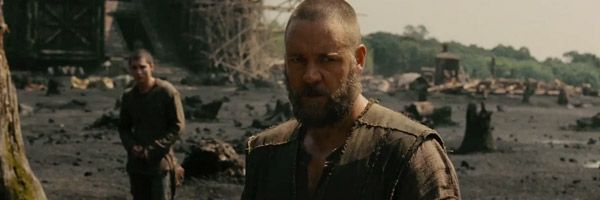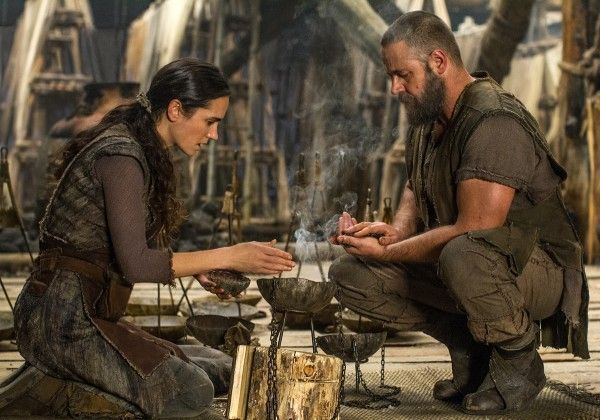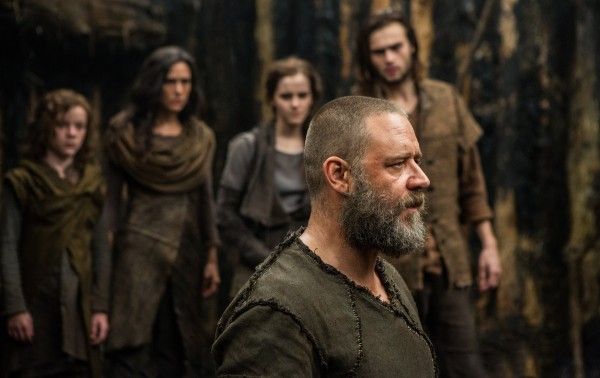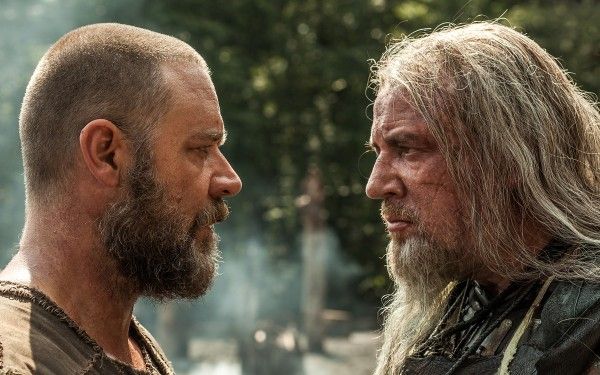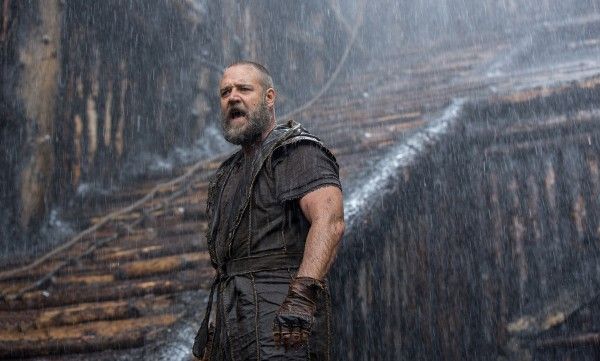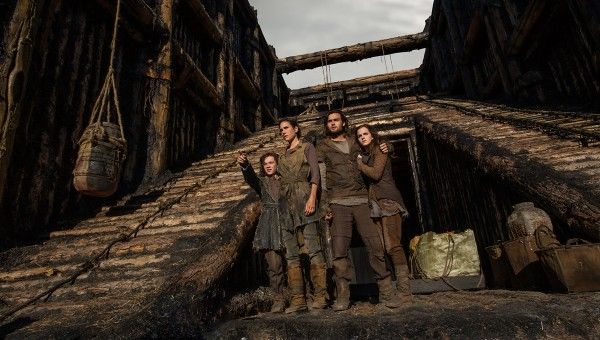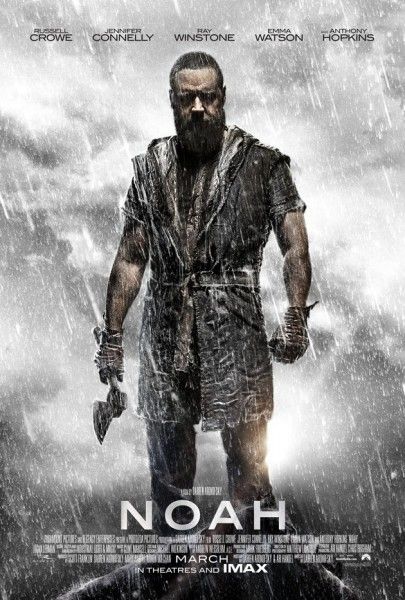Darren Aronofsky is one of my favorite filmmakers. It's been rewarding to watch him develop over the course of his five feature films (Pi, Requiem for a Dream, The Fountain, The Wrestler, and Black Swan) and how he's matured in approach to certain themes—namely, obsession and death. His latest feature, Noah, should be dripping with these two themes as it's the story of a man directed by God and willing to let the rest of the world die. While it does provide some intriguing departure from those themes, Noah feels like a series of compromises that soften the impact of the themes as Aronofsky gets bogged down in explanations that feel like excuses, and then struggles to return to the fascinating and complex moral drama at the center of the story. Although he has his frequent collaborators providing the picture with grandeur and majesty, and the filmmaker's trademark earnestness remains, his style begins to work against him as Noah veers between gritty reality and difficult humanism.
Drawing inspiration from the famous biblical tale, Noah uses the broad strokes to repaint the story into a struggle between good (the descendants of Seth) and evil (the descendants of Cain). The film dances around religious titles and chooses to name "The Creator" as one who instructs Noah (Russell Crowe) through dreams and visions to build the ark. Although Noah takes pride in his task at the outset, he starts to doubt if anyone, including his family, is worthy of being saved.
People expecting complete fidelity to the Genesis narrative will be sorely disappointed, but Aronofsky seems confused at how to explain the details of the story and where to suspend disbelief. The animals come to the ark, but in order to explain why they weren't constantly moving around and eating each other, the family uses a special smoke that can put all the creatures to sleep indefinitely. To explain how Noah and his family where able to build such a large structure, there are Watchers—fallen angels cursed to become part of the Earth—who assist in the ark's construction. But even at the dimensions specified by the Bible (the production researched the length of a cubit), there's no way it could hold two of every single animal in the world. Aronofsky's reasoning for what to explain and what to ignore is unclear and a bit frustrating.
There's also the constant question that eventually becomes the story's central conflict—how can humanity be fruitful and multiply if Noah's sons Shem (Douglas Booth), Ham (Logan Lerman), and Japheth (Leo McHugh Carroll), and his adopted daughter Ila (Emma Watson) be fruitful and multiply when Ila is barren and the sons have no wives? The question of how to grow humanity without incest is danced around constantly, which wouldn't be a problem except Aronofsky has put an emphasis on reality, so which facts should we accept and which ones should we overlook?
Obviously, all movies have varying levels of suspending disbelief, and with Noah it takes a little more work because he and co-writer Ari Handel have devised the plot in such a way that future of humanity is what's at stake, but we also have to ignore the role of human sexuality in procreation. It's not the easiest task, and perhaps it's worthwhile to shut it out because Aronofsky absolutely has some worthwhile ideas to consider.
The moral complexity at work in Noah is intriguing, and it's a bit disappointing that it takes so long for it to take center stage. A large portion of the movie is dedicated to Noah's practical journey—how he learns he's been chosen, how the ark is built, how the evil King Tubal-cain (Ray Winstone) plans to overtake the ark, etc. But as the story evolves, it begins to ask how anyone can be good, and if survival is only a matter of servitude. Noah serves the Earth and the Creator, the Watchers serve Noah, Tubal-cain's followers serve their king, and so we're left with one of the Bible's most difficult questions: if humans were given free will, how can they exercise it if they're required to serve the Creator? If left to our own devices, will humanity, even the "good people" of humanity like Noah and his family, inherently destroy the Earth?
This brings us back to the best part about Noah (other than Matthew Libatique's gorgeous cinematography and another must-own score by Clint Mansell), which is how Aronofsky uses the tale as a springboard for not only moral quandaries, but also environmentalism and survivor's guilt. He's using the past to explore problems of the present and the future, which is why it can be so annoying when he gets hung up on the logistics of the past.
It's also disappointing because it's slightly undermines the reward of seeing the director branch out into new ideas instead of re-contextualizing old ones. Obedience drives Noah more than obsession, and although the movie is steeped in death, we know it must end in life. It's challenging to venture out into new areas while still retaining an identity as a filmmaker, and although Noah displays some growing pains, I certainly wouldn't want to see him repeat himself but this time with a blockbuster budget.
One of the reasons I deeply respect Aronofsky is the fearlessness of his filmmaking. He has always been earnest with his audience, and never been afraid to wear his emotions on his sleeve. While this kind of attitude is usually bright and sunny, Aronofsky has used it to plumb the sadness, desperation, and sorrow of his characters. The ultimate conclusions can be uplifting (The Fountain), bittersweet (The Wrestler), or depressing as hell (Requiem for a Dream). He's always been willing to "go there", and there are moments in Noah that will have non-fans sniggering outright.
However, this earnestness backfires at times for even a die-hard fan like me because the film occasionally feels the need to not only explain the pragmatic aspects of Noah's journey, but also fall into the trap of telling instead of showing. Again, there's nothing inherently wrong with spelling out those themes, but here they lack the poetry of "Death is the road to awe" from The Fountain or Ellen Burstyn selling the hell out of her monologue in Requiem for a Dream where Sara explains how lonely she is. Despite Libatique and Mansell wrapping us up in the world, there's still some clumsiness in the delivery.
If Aronofsky shares anything with one of his film's themes, it's the difficulty of both destruction and rebirth. Noah could very well mark a turning point in his artistic development, and it's impossible to know if this is the end of the Aronofsky I respect or the beginning of a new one I'll admire even more. Even though the movie has its share of disappointments, it also has exciting possibilities both in the subtext and the filmmaking. For humanity, Noah lays out a path of despair and a path of hope. I won't say which one it chooses, but for Darren Aronofsky, I continue to hope.
Rating: B-

